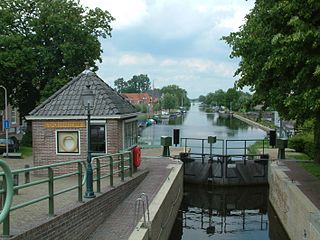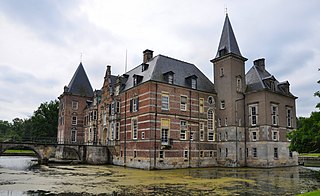
Overijssel is a province of the Netherlands located in the eastern part of the country. The province's name comes from the perspective of the Episcopal principality of Utrecht, which held the territory until 1528. The capital city of Overijssel is Zwolle and the largest city is Enschede. The province had a population of about 1,184,000 as of January 2023. The land mostly consists of grasslands and some forests ; it also borders a small part of the IJsselmeer to the west.

Zwolle is a city and municipality in the Northeastern Netherlands. It is the capital of the province of Overijssel and the province's second-largest municipality, after Enschede, and has a population of 132.441 as of December 2023. Zwolle borders the province of Gelderland and lies on the eastern side of the River IJssel.

Kampen is a city and municipality in the province of Overijssel, Netherlands. A member of the former Hanseatic League, it is located at the lower reaches of the river IJssel.

Wilsum is a small city in the Dutch province of Overijssel. It is located in the municipality of Kampen, about 4 km southeast of that city.

Zwartsluis is a small city in the Dutch province of Overijssel. It is located in the municipality of Zwartewaterland, at the mouth of the Zwarte Water river and the Meppelerdiep canal.

Delden is a city in the Dutch province of Overijssel and, since 2001, in the municipality of Hof van Twente. It received city rights in 1333. Twickel Castle is a famous landmark near Delden.

The Waterpoort or Hoogendster Pijp is a water gate, a gate in a defensive wall that connects a city to a waterway. It is situated in Sneek, the Netherlands.

The Noorderkerk is a 17th-century Protestant church in Amsterdam, The Netherlands. The Noorderkerk is located along Prinsengracht canal, on Noordermarkt square. The church is used for Dutch Reformed Church services and is also used regularly for classical music concerts.

The Pieterskerk is a late-Gothic Dutch Protestant church in Leiden dedicated to Saint Peter. It is known today as the church of the Pilgrim Fathers, where the pastor John Robinson was buried. It is also the burial place of the scientist Willebrord Snellius.

The Oost-Indisch Huis is an early 17th-century building in the centre of Amsterdam. It was the headquarters of the Amsterdam chamber of the Dutch East India Company. It is a listed Dutch national heritage site (rijksmonument).

Grote of Sint-Laurenskerk is a Protestant church in Rotterdam. It is the only remnant of the medieval city of Rotterdam.

The Koornmarktspoort is city gate in Kampen, Overijssel, the Netherlands. It was originally part of the city wall and is the oldest of the Kampen city gates.

The Oranje-Nassau Kazerne is a former military barracks in the centre of Amsterdam, along the Singelgracht canal, directly south of Artis zoo. Emperor Napoleon ordered the construction of this early 19th-century neoclassical building. Not long after construction of the building was complete in 1813, the French withdrew from the Netherlands, and the building was named in honour of the House of Orange-Nassau.

The Vrouwenhuis on Melkmarkt 53 in the Dutch city of Zwolle is a former old age home for women. It is now rented as separate apartment units for students, while housing a small museum on the ground floor that is only accessible by special request.

Eijsden Castle is a moated manor house with several farm buildings, a gatehouse and castle park, in Eijsden-Margraten, Limburg, Netherlands. The current castle was built in 1637 and is located next to the river Maas.
Huize Ivicke is a monumental building in Wassenaar, the Netherlands. Constructed in 1913 for A. F. J. van Hattum, it is a replica of the Eremitageslottet hunting lodge in the Jaegersborg Dyrehave in Denmark. It was inhabited until the mid-1980s, when it became offices. Since 2000, it has been owned by speculator Ronnie van de Putte, known as the "Slum King of the Netherlands". He refuses to renovate the building, despite its monumental status. Heritage groups warned the local municipality in the late 2010s that the villa was severely dilapidated and it was placed on a list of the fourteen most threatened monuments in Europe. It is currently the subject of an intense dispute over emergency renovations and was squatted in 2018, by people wanting to carry out essential repairs. The house, the formal garden, the gate and the playhouse are all national monuments.

Twickel is a protected historic country estate with 81 complex parts near Delden in the hamlet of Deldeneresch, in the municipality of Hof van Twente in the province of Overijssel in The Netherlands. The moated castle forms the center.

Windesheim is a village in the municipality of Zwolle in the province of Overijssel, Netherlands. The Congregation of Windesheim was located in Windesheim from 1387 until 1577.

The St. John's Church is a Protestant church in the Dutch village of Tzum, Friesland. Noteworthy is its 71 metres high church tower. A congregation of the Protestant Church in the Netherlands (PKN) gathers in the church.




















